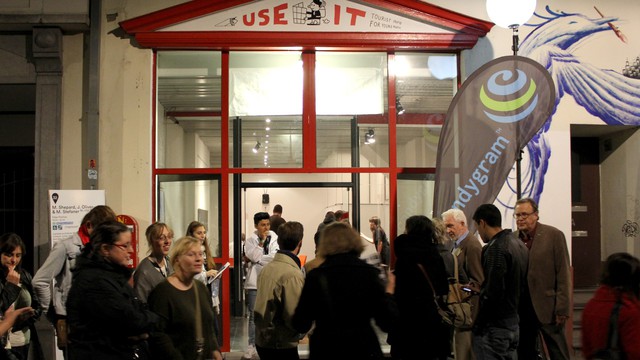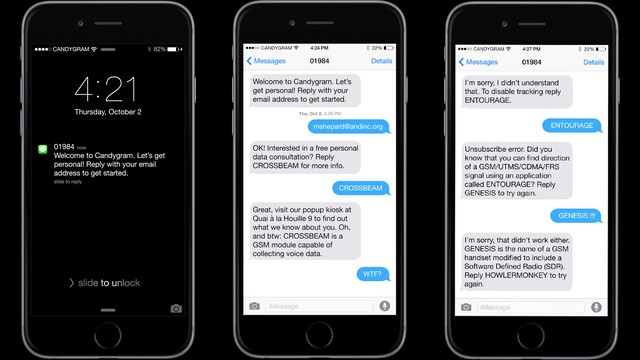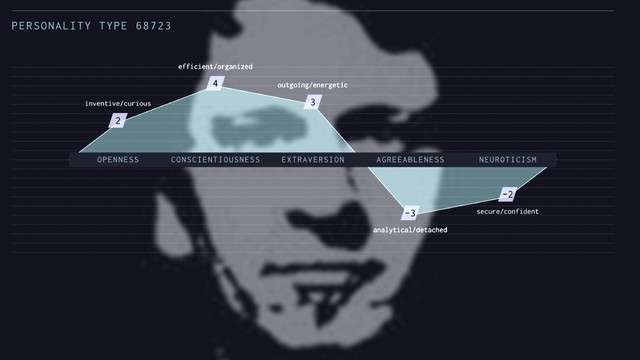False Positive 2016, Austria, Belgium, Germany, Spain, United Kingdom, Linz, Austria; Madrid, Spain; Brussels, Belgium; Hagen, Germany; Liverpool, UK
FALSE POSITIVE deploys text messaging, stealth infrastructure, street intervention, and data visualization to enact a surveillance conspiracy engaging the public in an intimate, techno-political conversation with the mobile technologies on which they depend.




It is not just the trust we place in network infrastructure but also our willingness to trade bits of personal data for access to online services that renders us vulnerable. Caught between the ruse and exploit, we find ourselves subject to ever more sophisticated forms of profiling, both online and off. Yet if algorithmically generated data-bodies are our future, they are also prone to error. FALSE POSITIVE deploys text messaging, stealth infrastructure, street intervention, and data visualization to enact a surveillance conspiracy engaging the public in an intimate, techno-political conversation with the mobile technologies on which they depend.
It is not just the trust we place in network infrastructure but also our willingness to trade bits of personal data for access to online services that renders us vulnerable. Data has increasingly become a part of daily life, and dataveillance has in turn become more robust and widespread than many had imagined. With the disclosures regarding the data collection and analysis activities of the NSA, coupled with the weaponization of social media profiling for political purposes by Cambridge Analytica, new questions emerge regarding our everyday data transactions and the inferences that can be drawn from them. To what degree can we see the increasing compromise of data by state and non-state actors as an indicator of the collapse of broader civic, cultural and political institutions? Caught between the ruse and exploit, we find ourselves subject to ever more sophisticated forms of profiling, both online and off. Yet if algorithmically generated data-bodies are our future, they are also prone to error. FALSE POSITIVE probes both the insecurity of mobile networks and the fallibility of online profiling, foregrounding the infrastructural politics underlying mobile communications systems and the surreptitious network practices of contemporary informatics regimes. It promotes public literacy surrounding the sensitivity of our data transactions, and what they can–and cannot–reveal about us. FALSE POSITIVE deploys text messaging, stealth infrastructure, street intervention, and data visualization to enact a surveillance conspiracy engaging the public in an intimate, techno-political conversation with the mobile technologies on which we depend. Engaging the subtle processes by which personal data can be exploited, and generating “data-portraits” based on social and spatial associations inferred from this data, the project probes the gray areas of both personal consent and statistical probability where a speculative association is established when there is in fact none.
Details
Project artist/ concept/ design/ planning : Moritz Stefaner, Mark Shepard. Thanks to Julian Oliver for initial support in concept and development.
Project sponsor/ support : False Positive was commissioned by iMAL, in collaboration with Ars Electronica, FACT Liverpool, and Medialab Prado within the framework of Connecting Cities, with the support of the Culture Programme 2007-2013 of the European Union and the Technē Institute for the Arts and Emerging Technologies at the University at Buffalo, The State University of New York.
Descriptions
Urban situation : Urban public space, private storefronts, festival venues
Participatory architecture & urban interaction
Community or communities involved : Urban media arts festival attendees, general public
Host organization : iMAL, in collaboration with Ars Electronica, FACT Liverpool, Medialab Prado, Urbane Künste Ruhr
Legal form : Open source
Issues addressed : See project description
Impact : The project premiered at Ars Electronica 2015 as part of the PostCity exhibition, which received ~ 5000 visitors/day. Subsequent performances were attended by audiences ranging from 500-2500 people/day, and incorporated hands-on workshops with 15-20 people each that introduced best practices for data privacy and security online and off.
Tools developed : Custom mobile phone (GSM) network infrastructure Software for SMS test messaging Web application for personal data mining and social media profiling
Tools used : Software - OpenBTS, custom web application Hardware - BladeRF, custom electronics
Mediacredits
Mark Shepard & Moritz Stefaner
Mark Shepard & Moritz Stefaner
Mark Shepard & Moritz Stefaner
Mark Shepard & Moritz Stefaner
Mark Shepard & Moritz Stefaner